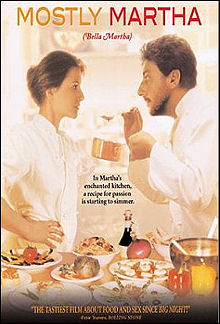What is that rancid cotton-candy Aguilera or Spears-like pop song playing all through the trailer for No Reservations (Warner Bros., 7.27). Turns out it’s a Liz Phair track called “Count On My Love.” Just one listen and I hated it. Screechy and alley-catty with a piercing helium wail.

So now I’m asking myself why a film scored by the great Phillip Glass is sending an entirely different musical message than the one in the trailer? Is the clarinet solo music on the No Reservations website a Glass composition? It sends out a very soothing vibe and accomplishes the opposite effect of that godawful Liz Phair tune — it makes me want to see the movie.
Are Warner Bros. marketers trying to scare away the fans of Mostly Martha, the 2002 German film that No Reservations is a remake of, and attract the younger women who didn’t get all the jokes in The Devil Wears Prada? One thing’s for sure: when a movie sends out radically conflicting musical messages in different ad mediums, there’s some kind of conflict going on between the filmmakers and the marketers.

I’m told that some LA screenings of No Reservations have been set up, but no one I know has been invited to any. I don’t know if the film is good or bad or so-so, but Warner Bros. has almost everyone convinced that there’s some kind of problem.
And if this is so, the feeling among the natives (i.e., myself and the people I talk to) is how could this have happened with such great source material to start with? Sandra Nettlebeck‘s Mostly Martha is one of the all-time best adult romances, best foodie movies and best mother-daughter stories all in one. And how could this have happened with the assistance of Scott Hicks, a once-promising director who delivered the very moving Shine not that many years ago?
This may or may not apply to No Reservations, so let’s make it rhetorical: why is it that when Americans remake European films they always feel the need to gloss things up…to make them much broader and dumber and more lower-com- mon-denominator than the original? Are American audiences simply thicker and shallower than European auds? Is the European need for sugar stimulation lower than that of Americans?
